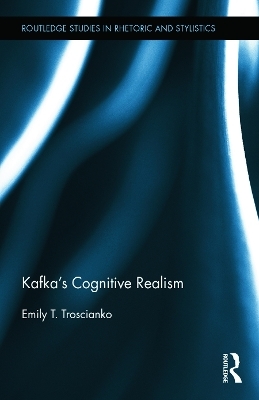
Kafka's Cognitive Realism
Seiten
2014
Routledge (Verlag)
978-0-415-64067-1 (ISBN)
Routledge (Verlag)
978-0-415-64067-1 (ISBN)
This volume shows how Kafka evokes vision and emotion as fundamentally enactive, and how this makes his writing "cognitively realistic" in this respect. Cognitive realism is introduced as a framework for exploring how fictional characters’ cognition correspond to or diverge from cognitive realities, and how this may affect real readers.
This book uses insights from the cognitive sciences to illuminate Kafka’s poetics, exemplifying a paradigm for literary studies in which cognitive-scientific insights are brought to bear directly on literary texts. The volume shows that the concept of "cognitive realism" can be a critically productive framework for exploring how textual evocations of cognition correspond to or diverge from cognitive realities, and how this may affect real readers. In particular, it argues that Kafka’s evocations of visual perception (including narrative perspective) and emotion can be understood as fundamentally enactive, and that in this sense they are "cognitively realistic". These cognitively realistic qualities are likely to establish a compellingly direct connection with the reader’s imagination, but because they contradict folk-psychological assumptions about how our minds work, they may also leave the reader unsettled. This is the first time a fully interdisciplinary research paradigm has been used to explore a single author’s fictional works in depth, opening up avenues for future research in cognitive literary science.
This book uses insights from the cognitive sciences to illuminate Kafka’s poetics, exemplifying a paradigm for literary studies in which cognitive-scientific insights are brought to bear directly on literary texts. The volume shows that the concept of "cognitive realism" can be a critically productive framework for exploring how textual evocations of cognition correspond to or diverge from cognitive realities, and how this may affect real readers. In particular, it argues that Kafka’s evocations of visual perception (including narrative perspective) and emotion can be understood as fundamentally enactive, and that in this sense they are "cognitively realistic". These cognitively realistic qualities are likely to establish a compellingly direct connection with the reader’s imagination, but because they contradict folk-psychological assumptions about how our minds work, they may also leave the reader unsettled. This is the first time a fully interdisciplinary research paradigm has been used to explore a single author’s fictional works in depth, opening up avenues for future research in cognitive literary science.
Emily T. Troscianko is Junior Research Fellow in Modern Languages at St John's College, University of Oxford, UK. Recent publications include "The Cognitive Realism of Memory in Flaubert’s Madame Bovary" (Modern Language Review 107 (2012): 772-95) and "Cognitive Realism and Memory in Proust’s Madeleine Episode" (Memory Studies, OnlineFirst 2013).
Introduction: Cognitive Realism, Kafka, and Literary Theory 1. Perception without Pictures 2. Re-Envisioning the Imagination 3. Kafka’s Poetics of Perception in Der Proceß 4.Feeling From New Perspectives Conclusion: Cognitive Realism in Kafka and Beyond
| Reihe/Serie | Routledge Studies in Rhetoric and Stylistics |
|---|---|
| Zusatzinfo | 14 Halftones, black and white; 14 Illustrations, black and white |
| Verlagsort | London |
| Sprache | englisch |
| Maße | 152 x 229 mm |
| Gewicht | 660 g |
| Themenwelt | Geisteswissenschaften ► Psychologie ► Allgemeine Psychologie |
| Geisteswissenschaften ► Psychologie ► Verhaltenstherapie | |
| Geisteswissenschaften ► Sprach- / Literaturwissenschaft ► Anglistik / Amerikanistik | |
| Geisteswissenschaften ► Sprach- / Literaturwissenschaft ► Literaturwissenschaft | |
| Geisteswissenschaften ► Sprach- / Literaturwissenschaft ► Sprachwissenschaft | |
| ISBN-10 | 0-415-64067-9 / 0415640679 |
| ISBN-13 | 978-0-415-64067-1 / 9780415640671 |
| Zustand | Neuware |
| Informationen gemäß Produktsicherheitsverordnung (GPSR) | |
| Haben Sie eine Frage zum Produkt? |
Mehr entdecken
aus dem Bereich
aus dem Bereich
Techniken der Verhaltenstherapie
Buch (2024)
Julius Beltz GmbH & Co. KG (Verlag)
35,00 €


